Autism Service Dogs
a Child's Best Friend
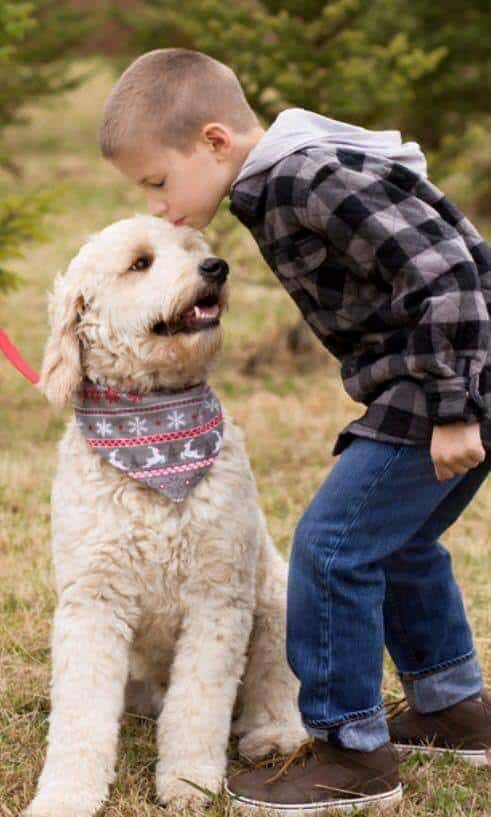
Autism Service Dogs are well-trained companions that improve the lives of those affected by Autism Spectrum Disorders. An Autism Service Dog can be helpful to children and adults alike! These faithful assistants come in a variety of breeds and sizes, and are selected to meet the individual needs of their handlers.
These amazing animals have proven to be an asset for children diagnosed with autism and their families. These dogs provide a variety of benefits from influencing social skills to offering additional safety measures.
Over the years, we have trained a multitude of breeds but have found Poodles and mixes (Doodles) to be client favorites due to their lack of shedding and hypoallergenic tendencies.
Service dogs for autism present a social “bridge” for children who are often excluded by others because of their behavior or lack of social interaction.
These well-trained autism service dogs can also provide comfort by calming children who may experience overstimulation or become quickly overwhelmed. Autistic children who run or wander away can also be quickly and easily found by autism service dogs that are trained to locate them.
The Benefits of an Autism Service Dog
There are numerous benefits of owning an autism assistance dog for children and families affected by autism.
These dogs are faithful companions that assist these children and families with activities of daily living as well as increasing the safety of the child and reducing the stress level of their family.
Some advantages of having an Autism Service Dog include:
Increased Social Interaction
Autism service dogs have been proven to improve social skills and social interaction for many children affected by autism. These dogs are naturally interesting which often draws the attention of the autistic child as well as others.
Improved Independence
Autism service dogs can provide independence by allowing the child to walk with the dog as opposed to constantly holding the hand of a parent or adult. These highly skilled dogs can assist the child while under the direction of the adult. Many children may eventually be capable of handling the dog as well.
Increased Vocabulary
Children with autism are often noticed to have an increase in vocabulary after being paired with a service dog. The children seem to be more comfortable in speaking with the dog which transfers to more verbal interaction with people.
Improved Quality of Sleep
Autism service dogs provide a certain level of comfort that can often improve a child’s ability to sleep more throughout the night. Additionally, having their service dog in the room at night can help children sleep in their own room rather than with their parents.
An Overall Calmer Environment
When performing everyday tasks, children feel less pressure working with a dog as opposed to their peers. The tactile experience of having a dog as a companion has also been proven to provide calming effects. Autistic children who work with dogs have been documented to feel less anger and experience fewer acts of aggression compared to the time before receiving an autism service dog.
"My daughter's service dog, Raja, was so well trained"
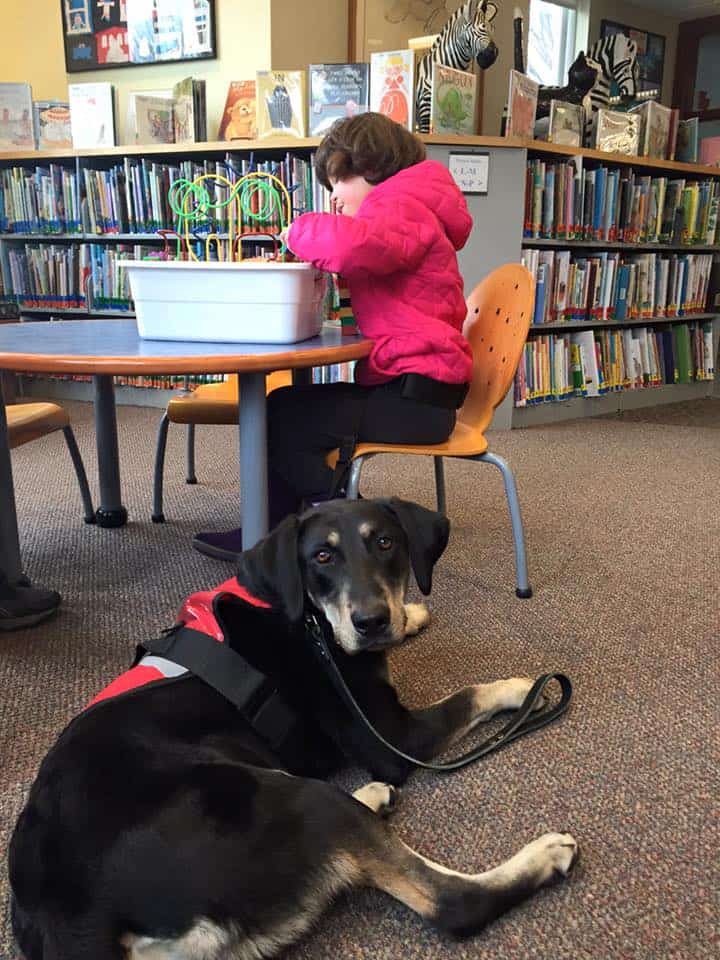
Tasks & Training
An autism service dog can be trained to complete many vital tasks which improve the quality of life for their handler.
Each trained task is chosen on the specific needs of a child or adult with autism. Our trainers have years of experience when it comes to ensuring your service dog performs these tasks reliably.
This improves safety, happiness and peace of mind for all members of the family.
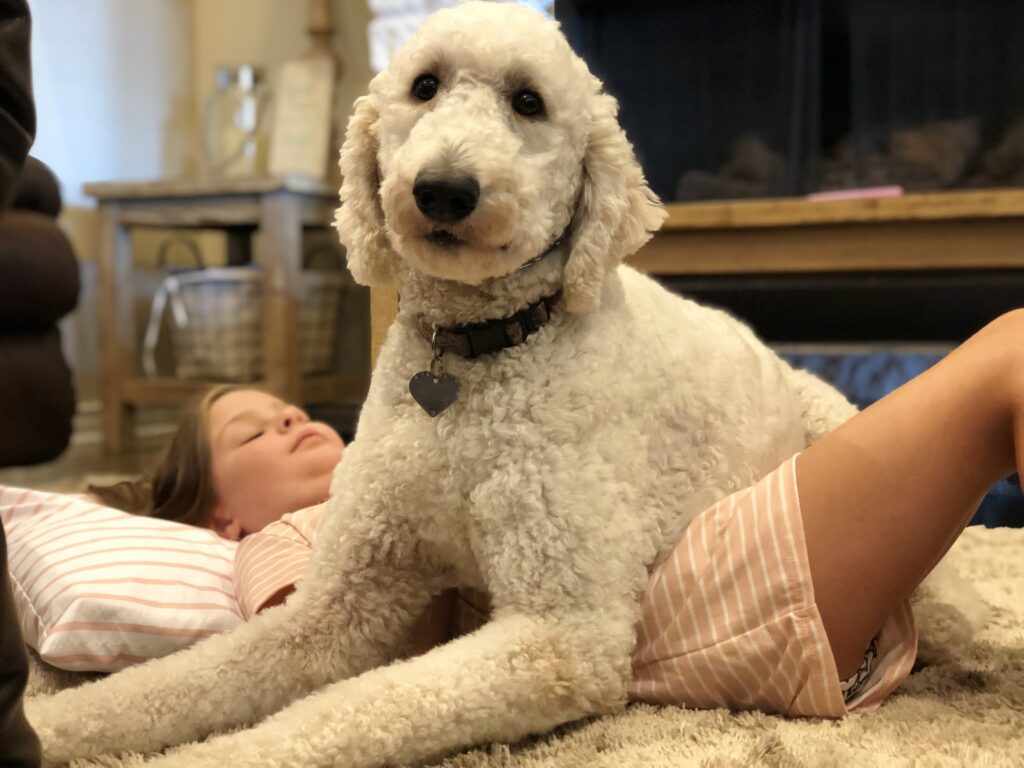
Deep Pressure Therapy
Many children with autism find comfort in weighted blankets, bear hugs, or other means of pressure on the physical body. Autism Assistance Dogs can be trained a task that involves placing their body on the child’s to offer that deep pressure. This can be beneficial during the onset of a meltdown, episodes of anxiety, overstimulation, etc. In addition, this task can encourage relaxation during bedtime to help with night awakenings and anxiety of sleeping in their room alone.

Tactile Stimulation on Command
When presented with overstimulating situations, some children may resort to repetitive self-stimulating behaviors that can often be damaging. These could include picking at skin, hitting their head, verbal repetitions, and many others. Autism Service Dogs can be trained to nudge or paw at the child to get their attention back on their dog rather than whatever may be upsetting them. This interruption can often aid in changing the habit of engaging in those self-stimulating behaviors.
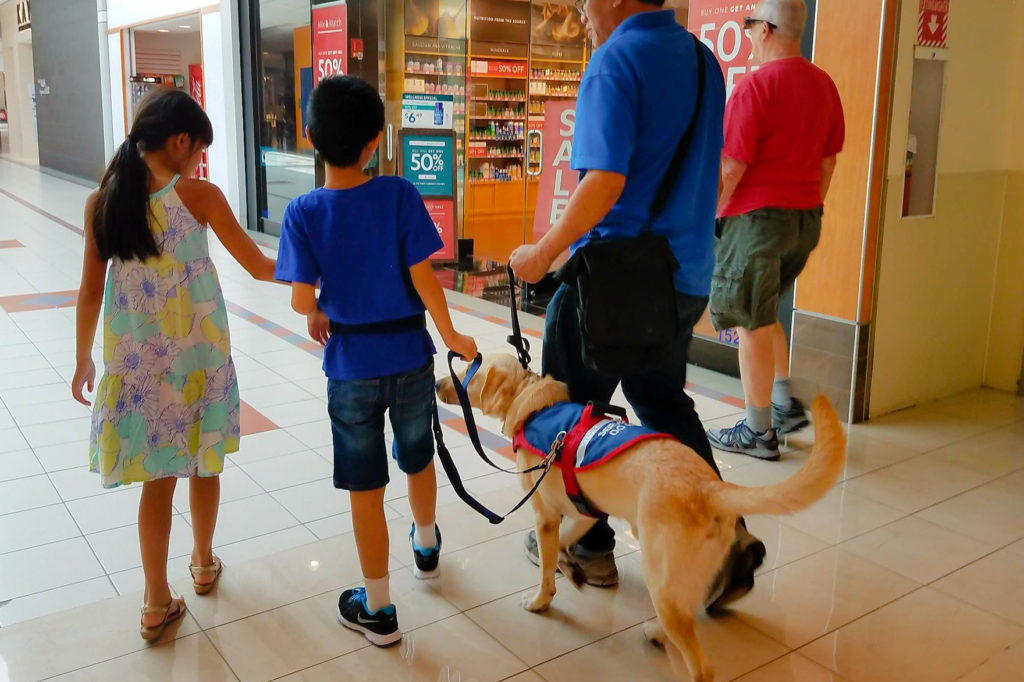
Tethering
For many parents, the safety of their child with autism is an immense concern. A large percentage of children are likely to either bolt or wander away in public. Many parents feel the need to keep a solid grip on their child at all times. Service Dogs for Autism are trained to understand the method of tethering so that the dog heels next to the parent/handler’s side and is tethered to the child. This prevents the child from wandering away or bolting away from the parents but also gives the child a bit more independence.
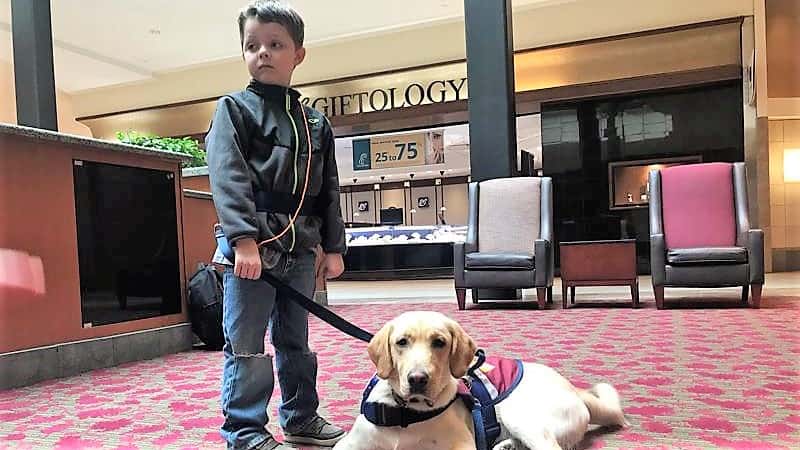
Emergency Down
As an additional safety measure, Autism Assistance Dogs can also be trained to drop and hold their ground when a child is in the act of bolting/running away. This task is helpful for children who have a history of bolting without understanding danger or consequences. If the dog and child are tethered but the child begins bolting, the parent can give a quick verbal command for the dog to immediately lie down and resist the weight of the child pulling against it. The dog must remain in that spot until released, giving the parent the chance to get to their child before they potentially bolt into the road or get too far away.
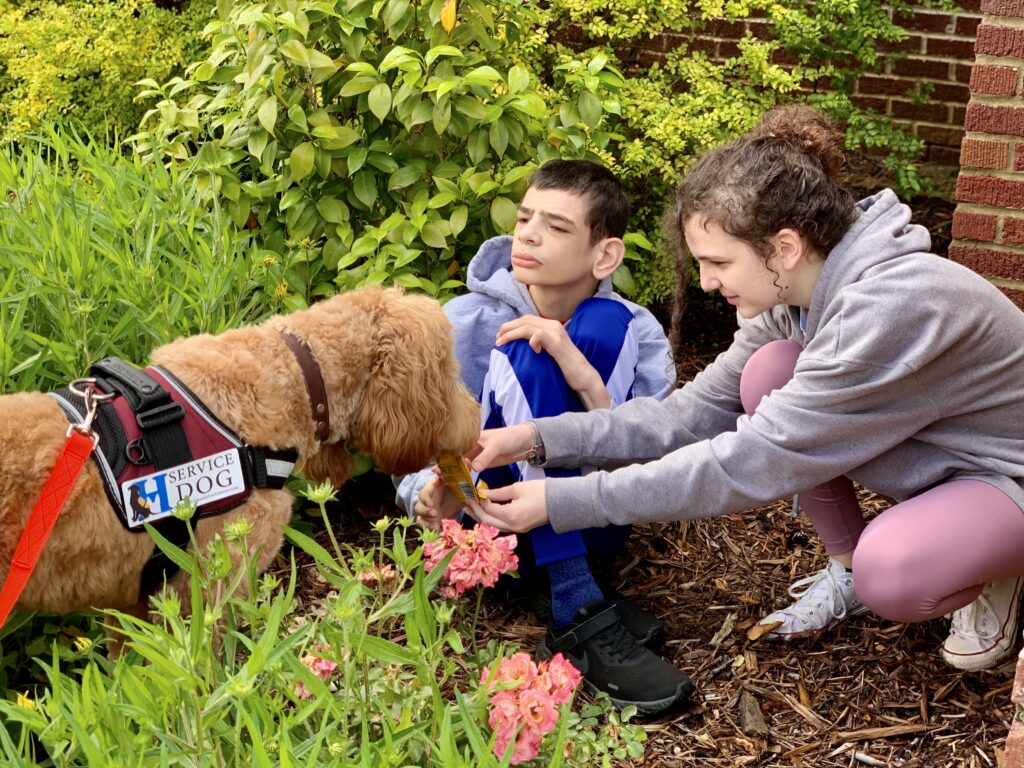
Search and Rescue Trailing
When it comes to eloping behaviors, the worst-case scenario can quickly become a reality. If a child does wander out of sight and the parent doesn’t know which direction they went, a Service Dog trained in search and rescue trailing can offer a huge peace of mind. Dogs have an incredible sense of smell which can be tailored to finding a specific odor and following it to the source, meaning that the parents could work with the service dog to quickly locate their missing child.
Note: Trailing is not included as a standard task for the Autism Service Dogs we provide, and typically incurs an additional fee if it is a requirement.
About Autism
Autism is a developmental disorder which affects the way a child sees and interacts with the world.
Data from the CDC estimates that approximately 1 in 54 children has an autism spectrum disorder (ASD).
Autism affects everyone in a different way, but typically, it triggers difficulty with sensory, memory, motor and postural control. Social and communication skills may be compromised leading to social isolation both within the family and with other people.
Many autistic children also display a tendency to bolt in open spaces making going to the store, park, or a restaurant almost impossible. Many autistic children also experience difficulty sleeping and often suffer from insomnia.
Children with autism are often misunderstood because they process information in a different way. Information is processed in a very detail-oriented way, meaning the individual with autism will sort through both major and minor stimuli, such as a car driving by, the smell of their clothing, or the sound of a dog barking, to make a decision.
Too many details can cause them to become overstimulated and confused by everyday situations. The causes of autism are uncertain, but most experts feel it is caused by a combination of genetic and environmental factors.
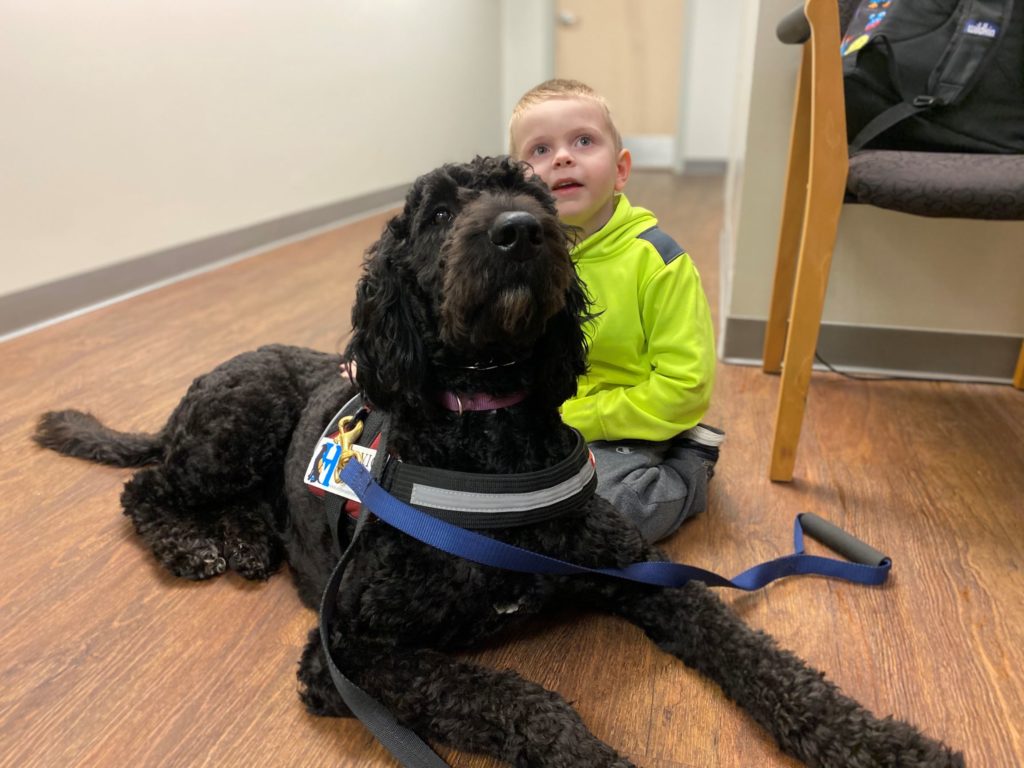
Autism is incredibly prevalent in children and young adults. The CDC has determined that approximately 1 in 54 children is diagnosed with an autism spectrum disorder (ASD).
1 in 37 boys
1 in 151 girls
"A best friend our son can trust."

Autism Service Dogs Are Changing Lives
Families all over the United States and the world have seen the effects firsthand of how an Autism Service Dog can change the life of their child and even bring improvements into the family’s lives as a whole.
Many parents have become trapped in a tedious routine to keep their child from having self-harming meltdowns. Others live with constant fear of their child wandering from them and getting lost.
Through the help of a service dog trained specifically for the struggles of each individual child and their family, countless families have witnessed life altering changes in their child.
Does My Child Qualify For An Autism Service Dog?
Every child is unique, from their personalities and likes/dislikes to their needs and lifestyle. As such, every child’s application is viewed individually, for what works for one family may not for another.
Several things must be taken into consideration during the application process of acquiring an autism service dog to ensure we develop a full picture of the family’s requirements, daily life, struggles, goals, and commitment.
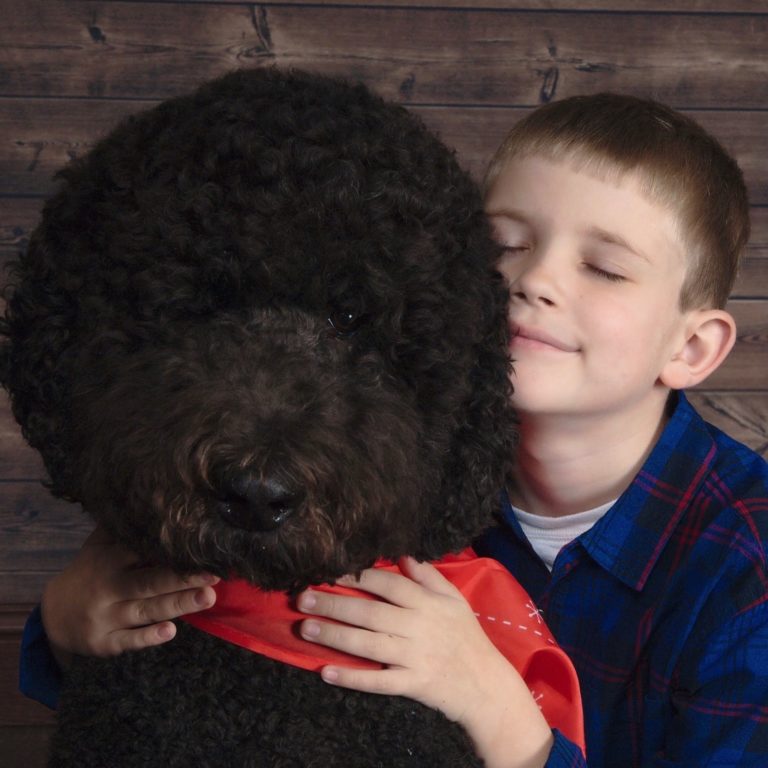
Learn More About Service Dogs
The service dog community has become vast and diverse in recent years. Now more than ever, families looking into autism service dogs are able to easily find an array of information at their fingertips. However, many have found that a lot of this information is confusing or even conflicting.
So where do you start? For information on service dogs, we suggest becoming familiar with the definition, guidelines, and rules available for review by the Americans with Disabilities Act. This information is straight from the source and a great option for educating yourself on the subject of service dogs.
The Process Of Training An Autism Service Dog
After entering our service dog program, the autism service dog candidates immediately begin socialization. Socialization is an extremely important aspect of service dog training and must be heavily incorporated into any service dog training program. The dogs are presented with a variety of environments, noises, and situations to test their environmental stability and ensure they are confident in all types of situations. Busy schools, crowded stores, and noisy city streets are only a few settings in which the service dog candidates must become comfortable and relaxed in. Eventually, the service dogs will be expected to perform in these places so it is crucial that they experience them early in training.
In addition, they get positive experiences with all types of different people. The service dogs in training learn to remain calm and present a gentle demeanor with children of all ages, as well as adults and seniors. They are also introduced to a variety of handling techniques to ensure they are tolerant and comfortable with children interacting with their fur, tails, paws, and more.
While socialization continues, the service dogs in training also begin learning how to accomplish the specific tasks needed for children with autism. Manners are essential so the service dog candidates work on their understanding of all the obedience commands and household rules that will apply when they are delivered. This will ensure that the service dog is easy to handle and work with while its owner is learning how to manage and utilize their child’s new autism service dog. Alongside obedience commands, the service dog candidates also become well-versed in the important and essentially life-changing tasks they will be providing for the autistic child they are being trained for.
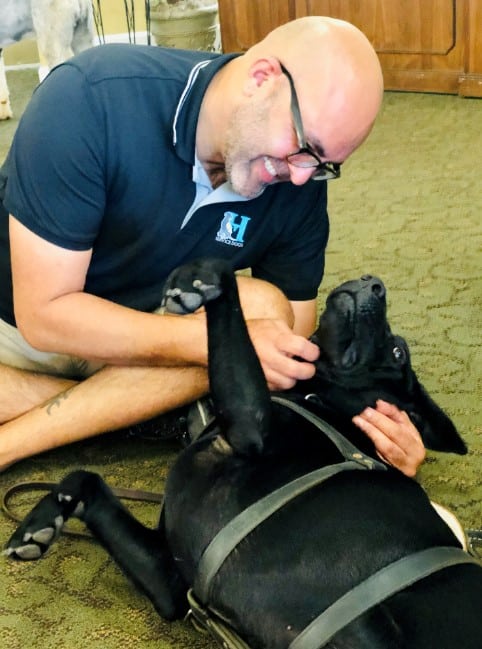
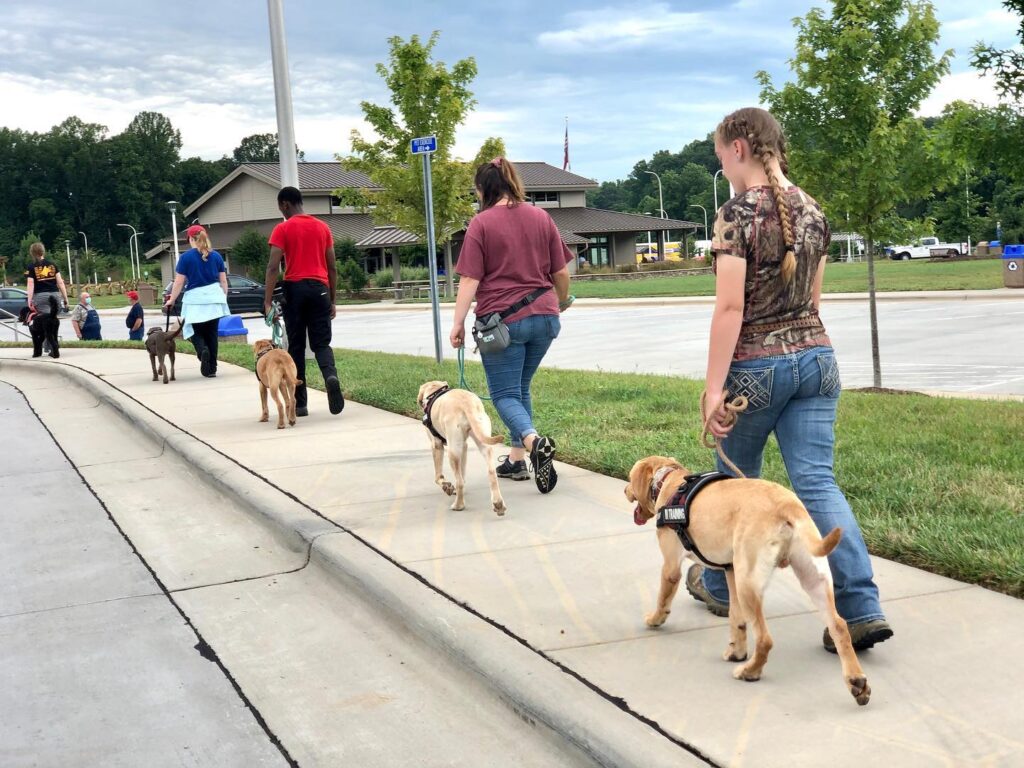
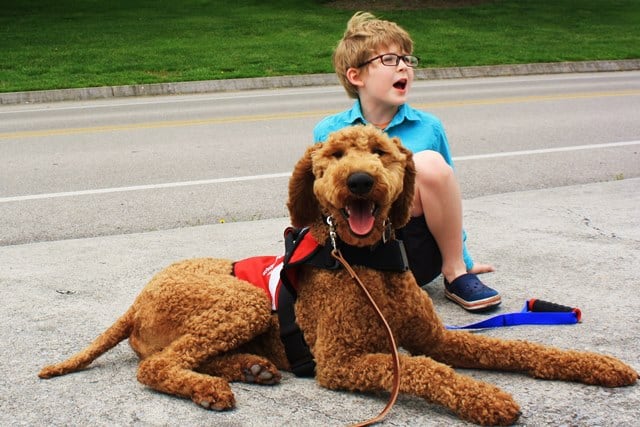
Contact us today!
Interested in adding an Autism Service Dog to your family? Have questions about the process? Contact us today and a member of our specialist team will reach out to you!
There are a number of ways to get in touch. Whether it’s telephone, email, social media or our contact form below, we’d love to hear how we can help you.
- 704.500.8281
- info@autismassistancedog.com
- Check us out on Facebook